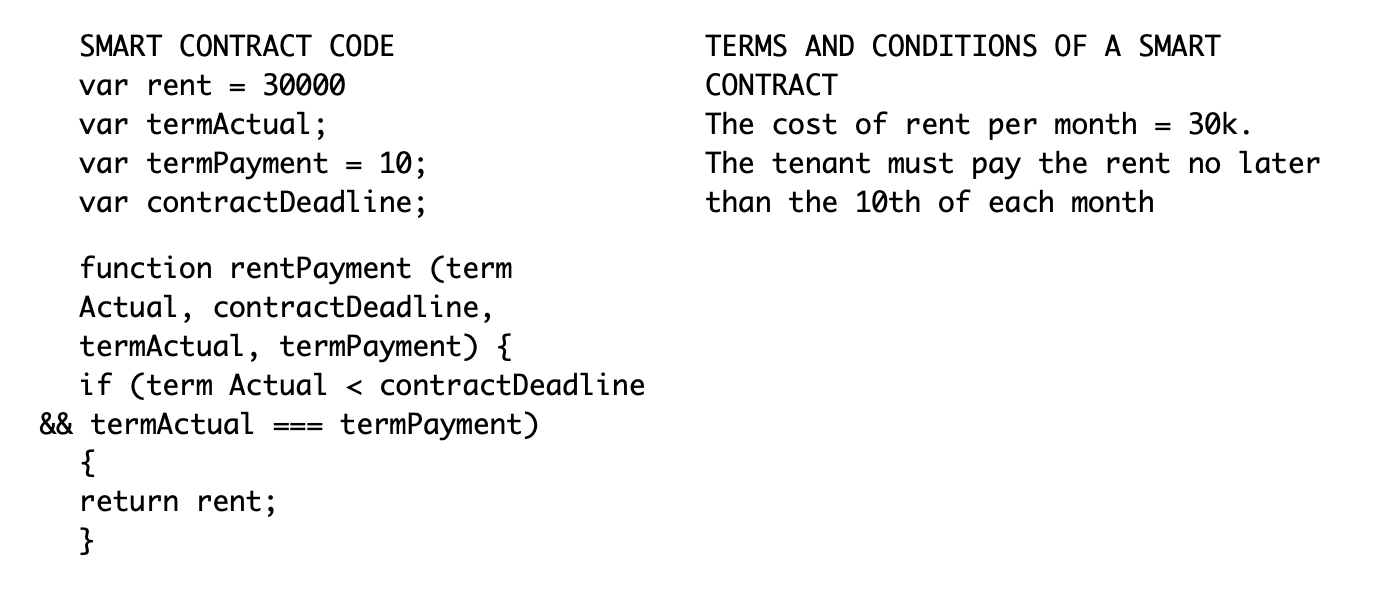Digitization helps to automate many processes and relieve people from performing routine work. One of the most important tools that allow transferring some tasks to the virtual space and tracking their execution is smart contracts.
What are smart contracts?
Smart contracts are programs with specified conditions that they must monitor for compliance. The tool allows automating many processes.
The creator of smart contracts is considered to be the developer Nick Szabo. He proposed the concept in 1994.
The technology gained popularity thanks to Ethereum, the second most capitalized cryptocurrency. The project's solutions allowed developers to start writing smart contracts for various requests based on the Solidity programming language. The second wave of popularity of the tool was due to DeFi.
How do smart contracts work?
Technically, a smart contract is code into which the developer enters certain requirements in advance.
For example, a tenant wants to rent out a property for 30,000 Dogecoins per month. At the same time, he needs the money on the 10th of each month. This information can be included in a smart contract that automates the process. Here's how it works:
What are smart contracts?
Smart contracts are programs with specified conditions that they must monitor for compliance. The tool allows automating many processes.
The creator of smart contracts is considered to be the developer Nick Szabo. He proposed the concept in 1994.
The technology gained popularity thanks to Ethereum, the second most capitalized cryptocurrency. The project's solutions allowed developers to start writing smart contracts for various requests based on the Solidity programming language. The second wave of popularity of the tool was due to DeFi.
How do smart contracts work?
Technically, a smart contract is code into which the developer enters certain requirements in advance.
For example, a tenant wants to rent out a property for 30,000 Dogecoins per month. At the same time, he needs the money on the 10th of each month. This information can be included in a smart contract that automates the process. Here's how it works:
- The parties agree on the contract terms and define specific requirements. The developer or automated platform that can create "smart" contracts enters information into the tool and activates it.
- Smart contracts need data on the tenant's account balance. To obtain them, the system connects to an oracle, a service that helps the program interact with other information sources.
- When the payment date arrives, the smart contract through the oracle makes a request to the tenant's account. If the required amount is on it, the program transfers the money to the owner's real estate wallet. If there are not enough assets, the conditions of the smart contract will not be met. The system will notify the parties of this.

Where can smart contracts be used?
There are practically no restrictions for smart contracts. They can be used not only to control timely payment of rent, as in the example above, but also for other tasks. Here are a couple of examples:
There are many other examples of the use of smart contracts in various industries, from logistics to medicine.
Pros and Cons of Smart Contracts
There are both advantages and disadvantages to this technology. Let's take a closer look at them.
Pros:
Cons:
Conclusions:
It turns out that smart contracts are a universal technology that allows for the automation of many processes. At the same time, the tool has a number of drawbacks, which can be addressed through the formation of a suitable legal framework for it and through careful attention to code programming.
There are practically no restrictions for smart contracts. They can be used not only to control timely payment of rent, as in the example above, but also for other tasks. Here are a couple of examples:
- In the US state of Wyoming, the CryptoFed company was created based on a smart contract. In July 2021, it was successfully registered.
- The American financial conglomerate Goldman Sachs conducted a repo transaction through the JPMorgan blockchain network with the support of smart contracts. The technology helped the parties to fix the terms of the agreements and track the fulfilment of obligations.
There are many other examples of the use of smart contracts in various industries, from logistics to medicine.
Pros and Cons of Smart Contracts
There are both advantages and disadvantages to this technology. Let's take a closer look at them.
Pros:
- Many processes can be automated, which is one of the main advantages of smart contracts.
- Smart contracts allow for a transparent system of monitoring contract performance conditions.
- The system can independently monitor the execution of contract conditions.
- Information about smart contracts is recorded on the blockchain, and the parties cannot change the terms of the contract after its conclusion.
- The technology, thanks to the ability to store information on the blockchain, allows for anonymous and secure financial transactions.
- Automating the process helps to avoid errors.
- Transferring agreements to a digital environment speeds up document flow and makes it easier.
Cons:
- A mistake in a smart contract can lead to a loss of money.
- Hiring a developer may be necessary to create a "smart" contract.
- In most countries, there is no legal framework for smart contracts.
Conclusions:
It turns out that smart contracts are a universal technology that allows for the automation of many processes. At the same time, the tool has a number of drawbacks, which can be addressed through the formation of a suitable legal framework for it and through careful attention to code programming.
